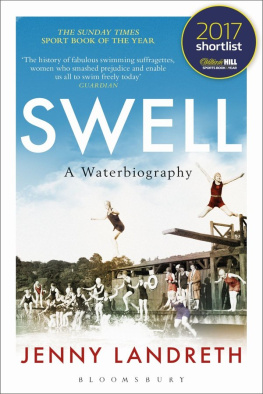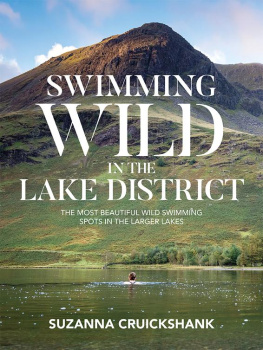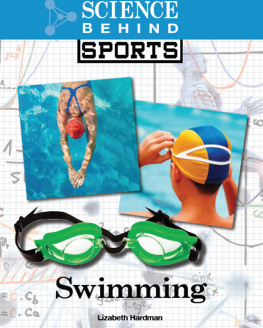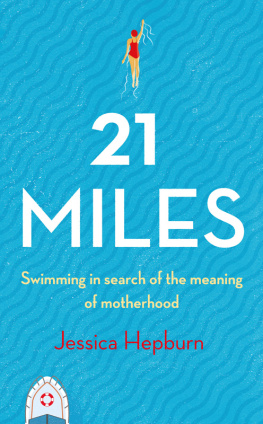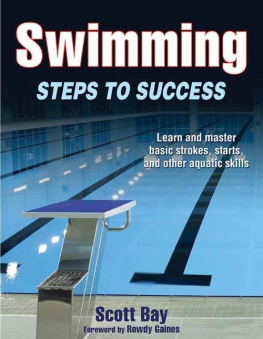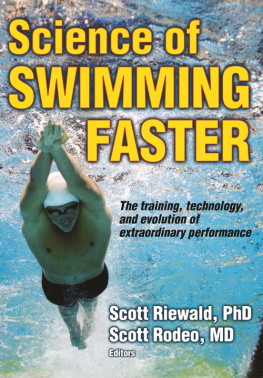it mixes warmth with anger and compels and engages at the same time Guardian
thoroughly researched and informative, full of strong opinion and sound judgment, but the joy of her book is the spiky, mischievous writing that knits it together. The Sunday Times
blissful The Times
Jenny Landreths tale of the swimming suffragettes is a wonderful account of lost stories from the canon of womens sports history Landreths book brings these stories to the mainstream. Anna Kessel
If you love swimming youll love this. If you hate swimming, youll still love this. From over-upholstered matrons gingerly climbing down the steps of wheeled bathing huts, to young girls swimming jawdropping distances up the Thames, this captivating book bowls along with wit and charm. Jo Brand
A brilliantly funny book that made me feel part of a proud and intrepid community of amphibian women. Josie Long
If this marvellous watery odyssey charting womens swimming history doesnt make you want to jump in, I will eat my woollen bikini. Doon Mackichan
A wry and inspiring mix of memoir and social history Melissa Harrison
As we jump into the waves with glee, Jenny Landreth asks us to consider swimming suffragettes who kicked hard for change in the once maledominated world of swimming, less than 100 years ago. Written through the prisms of memoir and social history, its the quest for equality that rises to the top of a poignant narrative. Coast
Billed as being the true story of the swimming suffragettes, this book both funny and informative follows the fearless women who battled for access to beaches, pools and lakes, and reveals the authors ownwaterbiography. Townswoman Magazine
Swell has the air of one long stand-up routine, a larky dash through the modern history of female swimmers. New Statesman
Curl up with the empowering story of the heroines who made swimming possible for women. Swell by Jenny Landreth is a must-read. Womens Fitness
A lighthearted, conversational history, with emphasis on the challenges women once faced just getting in the water, and the swimming suffragettes who defi ed genteel disapproval to claim the right to do so. Guardian
Swell interweaves Landreths own story with a history of female pioneers, swimming suffragettes who accomplished remarkable feats and paved the way for future generations She is at her best writing about swimmers past, and has done a thorough job of interviewing other swimmers. Economist
Landreths writing is accessible and down to earth, with wonderful asides. The Times Literary Supplement
Whereas the idea of diving into a pool seems like a great way to escape the heat, in the 19th century swimming was exclusively the domain of men and it wasnt until the 1930s that women were granted equal access to pools. Swell is the story of the women who made that possible, capturing the achievements and world of womens secret swimming. YAWN
The fearless women known as swimming suffragettes are celebrated in this wonderful book charting feminism and social history through the 19th and early-20th centuries. Sunday Herald
With examples of swimming heroines and some truly bizarre swimming cossies plus the story of how the author learned to swim, Swell will make you want to plunge straight in. Red
Jenny Landreth is a wonderful and hilarious writer, so this is in no way a stuffy account of historic events. She includes her own history of swimming, the 2012 Olympics, the developments in swimwear and, in her own unique way, the psychology behind why we swim. Wanderlust
Swell is part personal memoir, and part social history. Even if you arent as wildly enthusiastic about swimming as the author, youll fi nd her book written with humour and fondness. Lifeboat Magazine

Contents
ABOUT THE AUTHOR
Jenny Landreth is a script editor and writer. She has written two guide books, on the great trees of London and on the best places to swim in the capital. Jenny has written for all sorts of publications, and was the main contributor to the Guardians weekly swimming blog, covering everything from pool rules, to swimming with children, and where to swim in New York. She lives in London. @jennylandreth
The history of swimming is jam-packed with great photos of people in bizarre get-ups or extraordinary locations. But there is one photo I particularly love, of a group of ordinary-looking women leaping into an ordinary-looking lake judging from their costumes it probably dates from the late 1920s. One of the women is star-jumping off a high board into the water; she is clearly happy and physically confident, exuding a sense of abandon. Our lives are very differently circumscribed in every respect I have it much better than she did. We have, after all, come a long way. But still, I want to be her.
This is the story of how she and women like her got to jump into that lake and how I (eventually) did too. The story of how both of us became swimmers. How we came from having no rights to (almost) full parity, and how swimming can be a barometer for womens equality. How women had to fight for what we now take for granted and how the swimming suffragettes the women who did that fighting, did things first, who broke conventions and broke moulds, who achieved success against the odds helped us. The doors for todays swimmers did not open by accident or benevolence, and this is the story of the women who forced these doors open.
The famous quote about Ginger Rogers that she did everything Fred Astaire did only backwards and in high heels feels very appropriate here. This is the story of the swimming worlds equivalents of Ginger Rogers, and an opportunity to say thank you. Thank you for being so amazing, and for paving the way for the rest of us. But not everyone can be a Ginger Rogers, tap-dancing to Tesco in a glamorous outfit. That way social devastation lies. So this is not just a story about the famous women. This book features lots of ordinary people too. We all have our own story to tell about how we learned to swim (or not), our relationship with water, the people who encouraged us and the places we came to cherish or loathe. Im inordinately pleased with myself for coining the word waterbiography and I hereby grant you the right to use it freely. Because we all have a waterbiography, whether were ordinary or not. This book is mine. I hope it encourages you to delve into your own watery past and put your story together.
There are a few themes in this book: class, equality and struggle; perhaps the most constant is the snack theme. This book might make you hungry, so keep food handy while you read. And some of the inequities might make you rage; if thats the case, I highly recommend going for a swim.
*
Authors note: Im not a big fan of cute terms for the lady version of things. Some words have dropped from use more readily than others but it still requires constant vigilance for the eager feminist. I find it hard not to use the term actress for instance, but happily chucked the word comedienne in the bin. It feels like it belongs to a different era, to Marti Caine. I also disdain the practice of marketing perfectly normal things differently to women comedian Bridget Christie has a brilliant routine about Bic biros for her, about how womens hands are too delicate for your average man biro. I have an ironic pack of them on my desk but havent found the strength to rip the plastic open yet.
So why have I called some women in my book Miss? Ive called myself Ms for a good thirty years and to my knowledge it has rendered no man impotent with rage. But historical reports invariably identify women via their marital status, using Miss or Mrs, and when Im referring to those reports, I do the same. I think its preferable to use Miss rather than to simply use womens surnames, and Ive resisted that where possible, because it sounds rude and should be the preserve of public schools and Parliament. I have found that since I started using Miss and Mrs Ive taken to wearing a pinny and curtsying whenever a man comes into my home. It just feels right.
Next page
